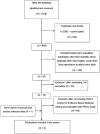A systematic review of high quality randomized controlled trials investigating motor skill programmes for children with developmental coordination disorder
- PMID: 27481937
- PMCID: PMC5482383
- DOI: 10.1177/0269215516661014
A systematic review of high quality randomized controlled trials investigating motor skill programmes for children with developmental coordination disorder
Abstract
Objective: To identify effective motor training interventions for children with developmental coordination disorder from research graded as high quality (using objective criteria) for the purpose of informing evidence-based clinical practice.
Data sources: We followed the guidance for conducting systematic reviews issued by the Centre for Reviews and Dissemination. Six OvidSP electronic databases (AMED, All EBM reviews (including Cochrane), Embase, Ovid MEDLINE, PsychARTICLES Full Text, PsycINFO) were searched systematically. We aimed to retain only randomized control trials and systematic reviews of randomized control trials, defined as the highest level of evidence by the Oxford Centre for Evidence-Based Medicine. We searched reference lists of retained articles to identify further appropriate articles.
Review methods: Two reviewers critically appraised and categorized articles by effect size (including confidence intervals), inclusion of power calculations and quality using the Physiotherapy Evidence Database (PEDro) scale. Only studies scoring seven or more on the PEDro scale (classed by the PEDro as high reliability) were retained.
Results: No systematic reviews met our criteria for inclusion from 846 articles yielded by the systematic search. Nine randomized control trials investigating 15 interventions to improve motor skills met our inclusion criteria for 'high quality'. Nevertheless, not all included studies were adequately powered for determining an effect.
Conclusion: Large effect sizes associated with 95 % confidence intervals suggest that 'Neuromotor Task Training', 'Task-oriented Motor Training' and 'Motor Imagery + Task Practice Training' are the most effective reported interventions for improving motor skills in children with developmental coordination disorder.
Keywords: Developmental coordination disorder; motor impairment; motor skill programmes; randomized control trial; systematic review.
Conflict of interest statement
Figures
References
-
- Magallon S, Crespo-Eguilaz N, Narbona J. Procedural learning in children with developmental coordination, reading, and attention disorders. J Child Neurol 2015. October; 30(11): 1496–1506. - PubMed
-
- American Psychiatric Association. Diagnostic and Statistical Manual of Mental Disorders: DSM V. Washington, DC, 2013.
-
- Polatajko H, Fox M, Missiuna C. An international consensus on children with developmental coordination disorder. Can J Occupat Ther 1995; 62: 3–6.
-
- Banks R, Rodger S, Polatajko HJ. Mastering handwriting: How children with developmental coordination disorder succeed with CO-OP. OTJR Occupat, Particip Health 2008; 28: 100–109.
-
- Lingam R, Jongmans MJ, Ellis M, Hunt LP, Golding J, Emond A. Mental health difficulties in children with developmental coordination disorder. Pediatrics 2012; 129: e882–891. - PubMed
Publication types
MeSH terms
Grants and funding
LinkOut - more resources
Full Text Sources
Other Literature Sources
Medical
Miscellaneous




